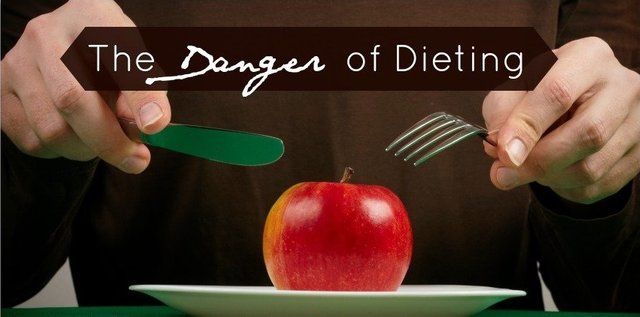Huge Risks of Dieting That Nobody Talks About
No matter how hard you try, the word "diet" appears to be unavoidable these days. Television commercials, billboards, social media, and nearly every health, fitness, and fashion magazine promote, criticise, and obsess over dieting. But the question is - Is it really worth the stress and hard work? Let's dive into the reality of dieting that nobody usually talks about.

Diets, despite their popularity (the average American dieter goes on four diets per year), are frequently ineffective.
Diets do not result in long-term weight loss for the vast majority of people (95 percent). In fact, two-thirds of people who diet will gain back more weight than they lost. What's even more surprising is that diets can be harmful to your health – both physically and mentally.
Let's look at some of these hidden dangers:
Decreased metabolism:
Metabolism is the amount of calories required to fuel our bodies in order for them to perform the most basic functions of life. Our metabolism speeds up when we eat more. Our metabolism slows down when we eat less. A typical diet reduces caloric intake, which slows your metabolism. Yes, weight loss will occur at first as a result of the caloric restriction, but any weight loss will eventually plateau. This means that one's internal metabolism has slowed to match the amount of calories consumed. This frequently leads to people “pushing harder” with caloric restriction and/or exercise in order to achieve negative energy balance. This can result in another bout of weight loss at first, followed by another plateau, as expected. The cycle of “pushing harder” continues, as does dissatisfaction with the results. Most of the time, people abandon their diets and revert to their old eating habits.Easier weight gain "following a diet" :
Diets do not teach us how to eat in moderation, control our portions, or truly be mindful and enjoy our food. Diets teach us which foods to limit, which foods to avoid, and the quickest way to lose weight. The problem is that metabolism slows down during the diet process (for example, someone eating 1,000-1,200 calories per day for a long period of time will have a metabolism that matches this, burning 1,000-1,200 calories per day). When a person returns to their previous eating habits and consumes more calories, they gain weight. This is one of the main reasons why people who go on strict diets end up regaining all of their lost weight, if not more.A deficiency in certain vitamins and minerals:
By removing food groups and specific foods from your diet, you risk deficiency in vitamins and minerals. Consider the "Mono Diet," which advocates eating only one food for an extended period of time (from one week to one month). Bananas, melons, and sweet potatoes are a few examples. You will not get all of the nutrients you need if you only eat one food or a small handful of foods on other diets. Eliminating starches like oatmeal, whole grain bread, potatoes, and rice reduces fibre and B vitamins. Dairy consumption will be reduced, reducing key sources of protein, calcium, and vitamin D. Fruit deprivation reduces many nutrients, including fibre, potassium, Vitamin C, and Vitamin A. Even eating too much protein, which is a common recommendation on many diets, can be harmful to your kidneys. Excess protein can cause stress and dehydration in the body, as well as acute kidney failure in some cases. Protein, when broken down after eating, forms a larger molecule that is more difficult for the kidneys to process.Use of fictitious language:
Many diets use wording that is difficult to dismiss because it sounds so convincing. Many diets claim to "cleanse" or "detox" our bodies, resulting in "immediate weight loss and fat burn." The truth is that our bodies already have organs like the liver that function to naturally detoxify our bodies. Our intestines cleanse our bodies by absorbing fibre and water. Following a diet plan will not result in true cleansing or fat loss. Another popular phrase is "quick and easy weight loss." While this is correct, rapid weight loss is both dangerous and unsustainable. When you lose weight quickly, you burn fat more quickly, which can lead to ketosis – a high level of ketones in the blood and urine that can be toxic. When you lose weight too quickly, your muscles become a major source of energy. The more muscles work to burn energy, the smaller and weaker they become. These phrases instil the irrational belief that the diet is a "cure-all" and a "magic pill." When this is not the case, we feel defeated and frequently blame ourselves if the diet does not work as well as we had hoped. This results in more guilt, self-doubt, and shame, which leads to more dieting and the unproductive cycle to continue. Take these factors into account the next time you consider dieting. Dieting will never make you look better, feel better, or become a better person. In fact, they can cause more harm than good.
If you're looking for nutritional assistance, let's talk. I won't charge :p